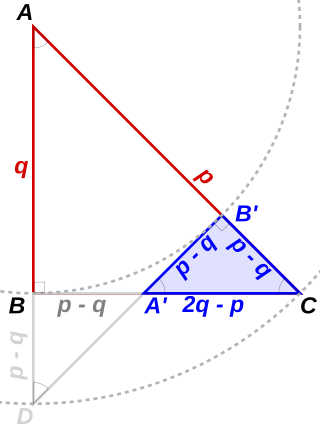First-order logic—also known as predicate logic, quantificational logic, and first-order predicate calculus—is a collection of formal systems used in mathematics, philosophy, linguistics, and computer science. First-order logic uses quantified variables over non-logical objects, and allows the use of sentences that contain variables, so that rather than propositions such as "Socrates is a man", one can have expressions in the form "there exists x such that x is Socrates and x is a man", where "there exists" is a quantifier, while x is a variable. This distinguishes it from propositional logic, which does not use quantifiers or relations; in this sense, propositional logic is the foundation of first-order logic.
In logic, the law of excluded middle states that for every proposition, either this proposition or its negation is true. It is one of the so-called three laws of thought, along with the law of noncontradiction, and the law of identity. However, no system of logic is built on just these laws, and none of these laws provides inference rules, such as modus ponens or De Morgan's laws.
Nihilism is a family of views within philosophy that rejects generally accepted or fundamental aspects of human existence, such as knowledge, morality, or meaning. The term was popularized by Ivan Turgenev and more specifically by his character Bazarov in the novel Fathers and Sons.

Franz Clemens Honoratus Hermann Josef Brentano was a German philosopher and psychologist. His 1874 Psychology from an Empirical Standpoint, considered his magnum opus, is credited with having reintroduced the medieval scholastic concept of intentionality into contemporary philosophy.
In predicate logic, an existential quantification is a type of quantifier, a logical constant which is interpreted as "there exists", "there is at least one", or "for some". It is usually denoted by the logical operator symbol ∃, which, when used together with a predicate variable, is called an existential quantifier ("∃x" or "∃(x)" or "(∃x)"). Existential quantification is distinct from universal quantification ("for all"), which asserts that the property or relation holds for all members of the domain. Some sources use the term existentialization to refer to existential quantification.

In term logic, the square of opposition is a diagram representing the relations between the four basic categorical propositions. The origin of the square can be traced back to Aristotle's tractate On Interpretation and its distinction between two oppositions: contradiction and contrariety. However, Aristotle did not draw any diagram; this was done several centuries later by Apuleius and Boethius.

In mathematics, an existence theorem is a theorem which asserts the existence of a certain object. It might be a statement which begins with the phrase "there exist(s)", or it might be a universal statement whose last quantifier is existential. In the formal terms of symbolic logic, an existence theorem is a theorem with a prenex normal form involving the existential quantifier, even though in practice, such theorems are usually stated in standard mathematical language. For example, the statement that the sine function is continuous everywhere, or any theorem written in big O notation, can be considered as theorems which are existential by nature—since the quantification can be found in the definitions of the concepts used.
In mathematics and logic, the term "uniqueness" refers to the property of being the one and only object satisfying a certain condition. This sort of quantification is known as uniqueness quantification or unique existential quantification, and is often denoted with the symbols "∃!" or "∃=1". For example, the formal statement
In mathematical logic, propositional logic and predicate logic, a well-formed formula, abbreviated WFF or wff, often simply formula, is a finite sequence of symbols from a given alphabet that is part of a formal language. A formal language can be identified with the set of formulas in the language.
Truthmaker theory is "the branch of metaphysics that explores the relationships between what is true and what exists". The basic intuition behind truthmaker theory is that truth depends on being. For example, a perceptual experience of a green tree may be said to be true because there actually is a green tree. But if there were no tree there, it would be false. So the experience by itself does not ensure its truth or falsehood, it depends on something else. Expressed more generally, truthmaker theory is the thesis that "the truth of truthbearers depends on the existence of truthmakers". A perceptual experience is the truthbearer in the example above. Various representational entities, like beliefs, thoughts or assertions can act as truthbearers. Truthmaker theorists are divided about what type of entity plays the role of truthmaker; popular candidates include states of affairs and tropes.
In analytic philosophy, actualism is the view that everything there is is actual. Another phrasing of the thesis is that the domain of unrestricted quantification ranges over all and only actual existents.

Space and survival is the idea that the long-term survival of the human species and technological civilization requires the building of a spacefaring civilization that utilizes the resources of outer space, and that not doing this might lead to human extinction. A related observation is that the window of opportunity for doing this may be limited due to the decreasing amount of surplus resources that will be available over time as a result of an ever-growing population.
Irish syntax is rather different from that of most Indo-European languages, especially because of its VSO word order.

Human extinction is the hypothetical end of the human species, either by population decline due to extraneous natural causes, such as an asteroid impact or large-scale volcanism, or via anthropogenic destruction (self-extinction), for example by sub-replacement fertility.

An existential graph is a type of diagrammatic or visual notation for logical expressions, proposed by Charles Sanders Peirce, who wrote on graphical logic as early as 1882, and continued to develop the method until his death in 1914.
Ernest Sosa is an American philosopher primarily interested in epistemology. Since 2007 he has been Board of Governors Professor of Philosophy at Rutgers University, but he spent most of his career at Brown University.
Kokota is spoken on Santa Isabel Island, which is located in the Solomon Island chain in the Pacific Ocean. Santa Isabel is one of the larger islands in the chain, but it has a very low population density. Kokota is the main language of three villages: Goveo and Sisigā on the North coast, and Hurepelo on the South coast, though there are a few speakers who reside in the capital, Honiara, and elsewhere. The language is classified as a 6b (threatened) on the Graded Intergenerational Disruption Scale (GIDS). To contextualize '6b', the language is not in immediate danger of extinction since children in the villages are still taught Kokota and speak it at home despite English being the language of the school system. However, Kokota is threatened by another language, Cheke Holo, as speakers of this language move from the west of the island closer to the Kokota-speaking villages. Kokota is one of 37 languages in the Northwestern Solomon Group, and as with other Oceanic languages, it has limited morphological complexity.

A global catastrophic risk or a doomsday scenario is a hypothetical event that could damage human well-being on a global scale, even endangering or destroying modern civilization. An event that could cause human extinction or permanently and drastically curtail humanity's existence or potential is known as an "existential risk."
The paradox of nihilism is a family of paradoxes regarding the philosophical implications of nihilism, particularly situations contesting nihilist perspectives on the nature and extent of subjectivity within a nihilist framework. There are a number of variations of this paradox.
In logic, a quantifier is an operator that specifies how many individuals in the domain of discourse satisfy an open formula. For instance, the universal quantifier in the first order formula expresses that everything in the domain satisfies the property denoted by . On the other hand, the existential quantifier in the formula expresses that there exists something in the domain which satisfies that property. A formula where a quantifier takes widest scope is called a quantified formula. A quantified formula must contain a bound variable and a subformula specifying a property of the referent of that variable.






